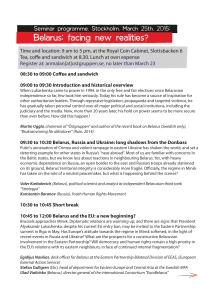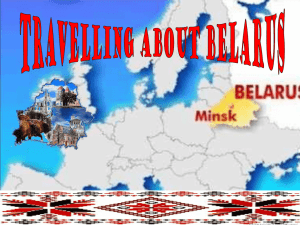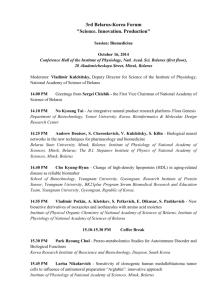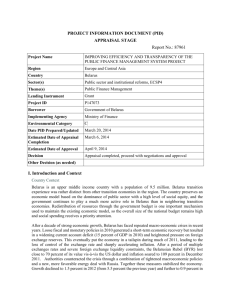UPR Advance Questions - Micronesia
advertisement
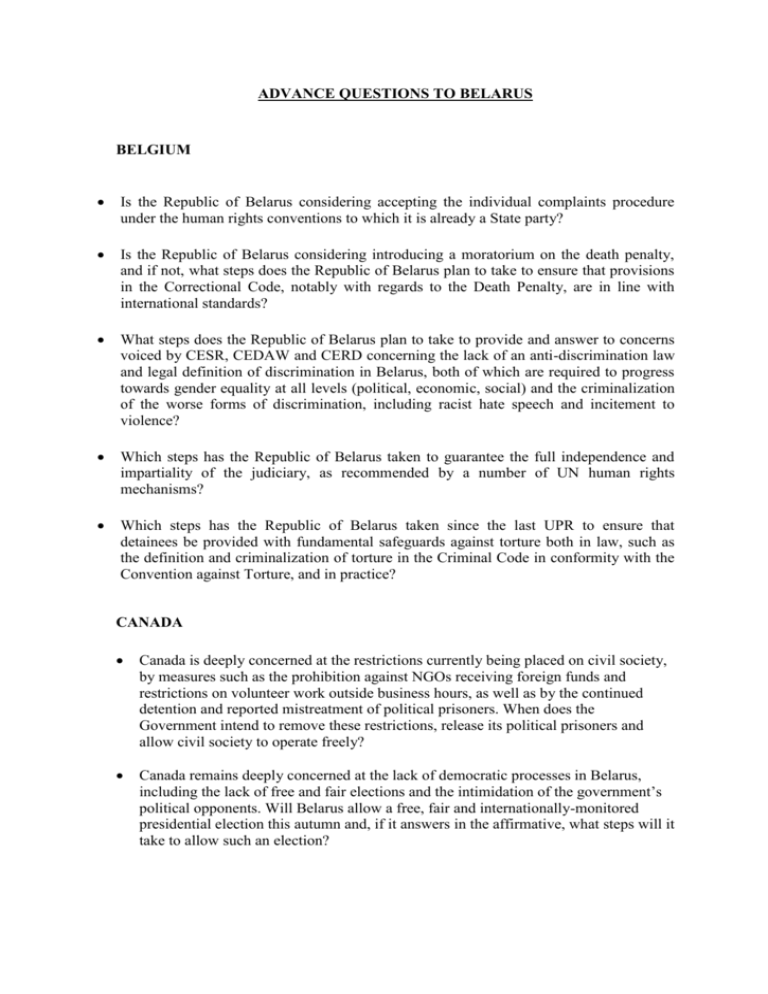
ADVANCE QUESTIONS TO BELARUS BELGIUM Is the Republic of Belarus considering accepting the individual complaints procedure under the human rights conventions to which it is already a State party? Is the Republic of Belarus considering introducing a moratorium on the death penalty, and if not, what steps does the Republic of Belarus plan to take to ensure that provisions in the Correctional Code, notably with regards to the Death Penalty, are in line with international standards? What steps does the Republic of Belarus plan to take to provide and answer to concerns voiced by CESR, CEDAW and CERD concerning the lack of an anti-discrimination law and legal definition of discrimination in Belarus, both of which are required to progress towards gender equality at all levels (political, economic, social) and the criminalization of the worse forms of discrimination, including racist hate speech and incitement to violence? Which steps has the Republic of Belarus taken to guarantee the full independence and impartiality of the judiciary, as recommended by a number of UN human rights mechanisms? Which steps has the Republic of Belarus taken since the last UPR to ensure that detainees be provided with fundamental safeguards against torture both in law, such as the definition and criminalization of torture in the Criminal Code in conformity with the Convention against Torture, and in practice? CANADA Canada is deeply concerned at the restrictions currently being placed on civil society, by measures such as the prohibition against NGOs receiving foreign funds and restrictions on volunteer work outside business hours, as well as by the continued detention and reported mistreatment of political prisoners. When does the Government intend to remove these restrictions, release its political prisoners and allow civil society to operate freely? Canada remains deeply concerned at the lack of democratic processes in Belarus, including the lack of free and fair elections and the intimidation of the government’s political opponents. Will Belarus allow a free, fair and internationally-monitored presidential election this autumn and, if it answers in the affirmative, what steps will it take to allow such an election? CZECH REPUBLIC Is the Government of Belarus considering abolishing the capital punishment or imposing a moratorium thereon? Does it intend to ratify the Second Optional Protocol to the International Covenant on Civil and Political Rights aiming at the abolition of the death penalty? Referring to two of the accepted recommendations in the first cycle (98.32 and 98.33), could the Government elaborate on measures taken to prevent and address attacks against and harassment of independent journalists, human rights defenders and political activists and to hold their perpetrators accountable? What safeguards are in place to ensure that no arbitrary arrests and detentions take place? Does Belarus intend to release the remaining prisoners who are believed to have been convicted for political reasons? What improvements have been achieved in the conditions in prison and detention facilities and especially pre-trial detention facilities since the last periodic review? Does the Government consider acceding to the Optional Protocol to the Convention against Torture and other Cruel, Inhuman or Degrading Treatment or Punishment (OP-CAT)? Is the Government considering revising the controversial Article 411 of the Criminal Code, which allows for the extension of imprisonment term for mere disobedience of prison administration? Does the Government intend to simplify the registration process for NGOs so that more of them can function legally? Or alternatively, does it intend to amend national legislation in order to make sure that citizens who participate in organisations that are not registered yet do not face criminal penalties? Is Belarus considering inviting the UN Special Rapporteur on human rights in 2015, so that he can give a comprehensive and balanced report on the human rights situation in the country? What measures does the Government of Belarus plan to adopt to ensure that the upcoming Presidential elections are free and fair and that all candidates have the same opportunities for contesting in the vote? What steps have been made to investigate and prosecute allegations of torture and ill-treatment of and the use of excessive force against protesters following the 2010 Presidential elections? GERMANY Recently, Belarus has announced its readiness to cooperate and receive several Special Procedures mandate holders. Have any visits of Special Procedures mandate holders to Belarus been scheduled since then? With which mandate holders is Belarus currently in contact regarding future country visits? What concrete steps is Belarus taking towards introducing a moratorium on the death penalty, with a view to abolish the death penalty and accede to the Second Optional Protocol to the ICCPR? In the first UPR Round in 2010 Belarus accepted to consider the establishment of a national human rights institution in accordance with the Paris Principles. In July 2014 Belarus organized an international conference on this issue. What is the state of development in this regard? NETHERLANDS Death penalty (previous recommendation of the NL – 2010) Which steps is the government of Belarus willing to undertake that ultimately lead to the abolition of the death penalty? Freedom of Assembly and Association (previous recommendation of the NL – 2010) Which concrete steps have the Belarusian authorities taken and are willing to take to ensure, in its laws and regulations and particularly in practice, that representatives of civil society and human rights defenders can peacefully and without fear for arbitrary arrest exercise their right to freedom of expression and freedom of assembly in conformity with the dispositions of the International Covenant on Civil and Political Rights and are they willing to decriminalize activities of individuals on behalf of non-registered organizations by abolishing article193-1 of the Criminal Code? Will the government of Belarus simplify and ease the legislation on registration of political parties, organisations and funds, in view of the fact that already many years no new political parties have been registered and respectable human rights organisations like Viasna have repeatedly been refused their registration? Freedom of expression and media (previous recommendation of the NL – 2010) Noting that free, diverse and independent media are essential in any society and referring to the call of OSCE representative on Freedom of the Media Dunja Mijatović on the Belarusian authorities to stop imposing restrictive measures on freelance journalists, hindering them to do their job in a free and safe manner, the Netherlands would like to know what follow-up has been given to the previous recommendation in 2010 to bring its laws, and especially the law on Mass media, as well as the implementation of the laws into line with international standards on press freedom and what steps the government of Belarus is willing to take to facilitate people to exercise their right to press freedom? What steps is the government of Belarus willing to take to move away from requirements for small scale demonstrations, including one-person pickets, for approval by local authorities and service contracts with the police, ambulance and public utilities, and thus facilitate people to exercise their right to freedom of expression? Cooperation with international human rights and justice mechanisms Which steps is the government of Belarus planning to take to deepen cooperation with and implementation of international human rights and justice mechanisms including the UN Human Rights Council Special Procedures, the International Convention for the Protection of All Persons from Enforced Disappearance and the Rome Statute of the International Criminal Court (ICC)? - - Will the government of Belarus allow access to the UN Special Rapporteur on the situation of human rights in Belarus? Will the government of Belarus take concrete steps to implement the recommendations of the report of the Parliamentary Assembly of the Council of Europe on disappeared persons in Belarus and is Belarus willing to ratify the Convention? Will the government of Belarus accede to and fully align its national legislation, including by incorporating provisions to cooperate promptly and fully with the International Criminal Court and to investigate and prosecute genocide, crimes against humanity and war crimes effectively before its national courts? Anti-discrimination Which concrete steps have been taken by the authorities to ensure and promote gender equality, to raise awareness of and respect for the rights of LGBT-people, to create an enabling environment for people with disabilities to participate in all elements of life in Belarusian society and to prevent and act upon hate speech? NORWAY How do the Belarusian authorities plan to safeguard the rights of its citizens, amongst them political opponents, journalists and human rights activists, to free and fair elections in the expected presidential election this year? What steps will be taken to ensure that the vents of December 2010 are not repeated? What steps will the authorities take to comply with the recommendations made by the OSCE representative on Freedom of Media? When will the authorities allow the Special Rapporteur on human rights unfettered access to Belarus? SLOVENIA We noted with interest the report that a range of human rights education measures are being carried out and that children and young people at all levels of education are taught about the rights of the child, human rights and international humanitarian law. How is human rights education incorporated in the school curricula? What kind of training or workshops are available for teachers? Are there any concrete discussions or activities within the working group on death penalty on establishing a de jure moratorium on the use of death penalty with a view to its abolition? SWEDEN What steps does the Republic of Belarus aim to take to align itself with the practice of all other European states on the matter of the death penalty? Does the Republic of Belarus plan to introduce any amendments to its legislation, which would guarantee that families of convicted persons have the opportunity to bide farewell and bury the bodies in accordance with family traditions? What does the Republic of Belarus aim to do in order to guarantee the freedom of expression, avoid arbitrary decisions and ensure proportionality, e.g by defining “harming the interest of the state”? SWITZERLAND After the designation of a parliamentary group and the holding of roundtable on the death penalty, what are the next steps envisaged by the government of Belarus to promote an informed debate on the use of the death penalty, with a view to abolishing capital punishment? Is the government of Belarus considering ratification the Rome Statute of the International Criminal Court and of the Optional Protocol to the UN Convention against torture (OPCAT) and t? If not, what is the rationale behind the refusal of joining these two instruments? Is the Government of Belarus considering submitting its reports due to the United Nations Treaty Bodies, in particular the report due since 2001 to the Human Rights Committee? Is the Government of Belarus considering implementing the recommendations of the Human Rights Committee, including those arising from individual communications? Is the Government of Belarus considering inviting and granting entry to the Belarusian territory to the UN Special Rapporteur to Belarus and engaging constructively with the mandate? UNITED KINGDOM OF GREAT BRITAIN AND NORTHERN IRELAND A new law was introduced in Belarus on 1 January 2015, restricting media freedom for all forms of mass media, both printed and online. Could you tell us why this new law was introduced and whether there are plans to repeal it given that it does not meet international standards for freedom of the media? A recent court case denied the family of an executed prisoner the right to know where his body is buried. Could you provide information on why families are not given the right to know of the execution date and the opportunity to be involved in the interment arrangements? We note the work done to improve the laws regarding discrimination. We would be grateful if you would provide further information on any projects or programmes being undertaken to end discrimination of minorities, and also whether Belarus intends to update its laws to make it illegal to discriminate on the grounds of sexual orientation. We would be grateful if you would provide information on your preparations for presidential elections. In particular, concerning plans to ensure that other political parties are able to be actively involved in the elections and any new provisions for a more transparent and open vote counting processes. What steps are being taken by the Government of Belarus to improve the onerous and restrictive processes for the registration of political parties and NGOs, and for requests to hold public meetings? How does the Government plan to bring the laws covering freedom of association and assembly in line with international standards? UNITED STATES OF AMERICA When will the Government of Belarus invite the Special Rapporteur on the Situation of Human Rights in Belarus to visit the country? What steps is the Government of Belarus taking to implement recommendations from the Organization for Security and Cooperation in Europe’s Office for Democratic Institutions and Human Rights (OSCE/ODIHR) to amend the electoral code and other laws to provide for free and fair elections? What steps is the Government of Belarus taking to ensure that individuals working for independent media organizations receive accreditation and are able to exercise their right to freedom of expression, both online and offline? What steps is the Government of Belarus taking to implement the recommendations of the International Labor Organization’s Commission of Inquiry (COI) to ensure the right of workers – in both law and practice – to establish organizations of their own choosing and to organize their activities and programs free from interference by the public authorities?

